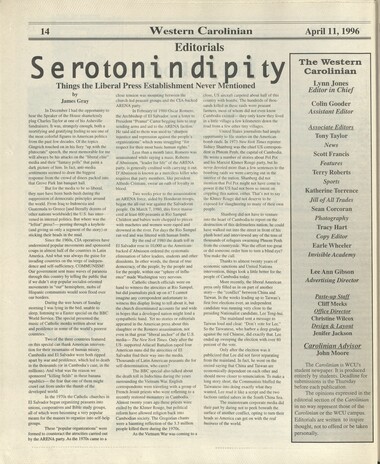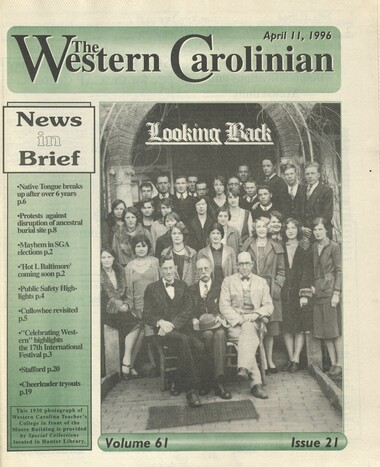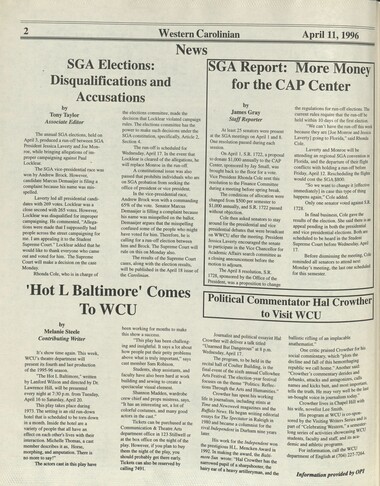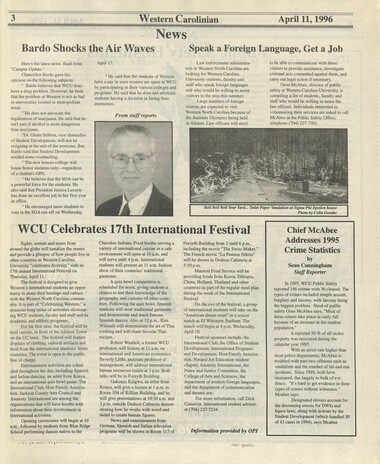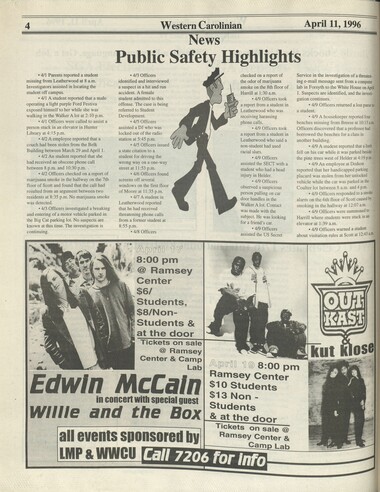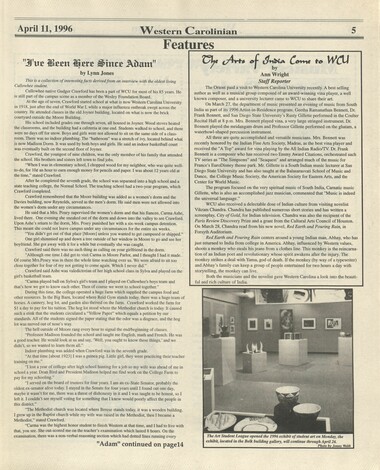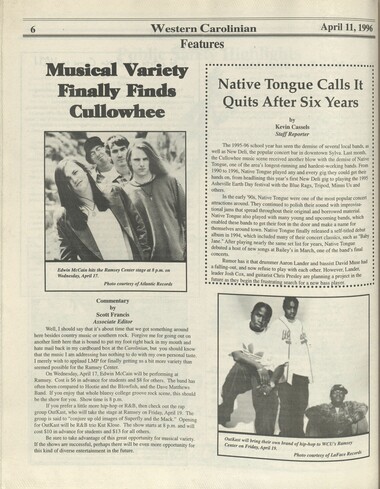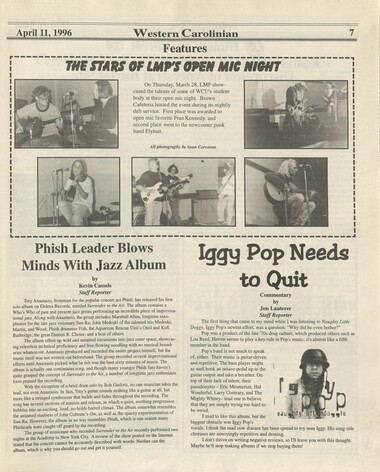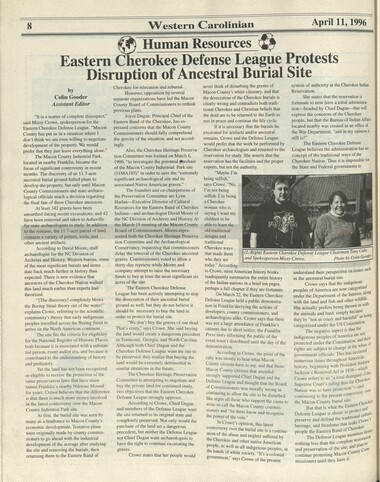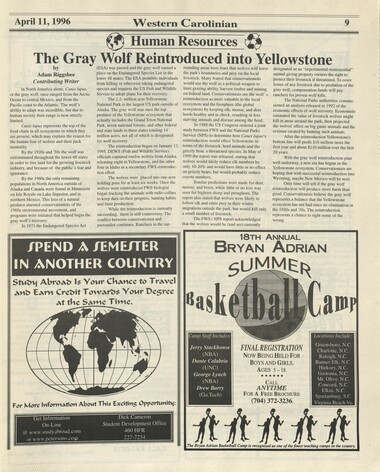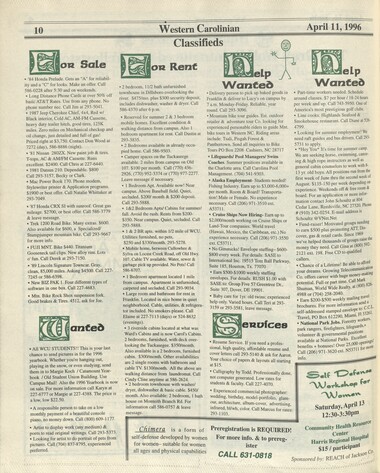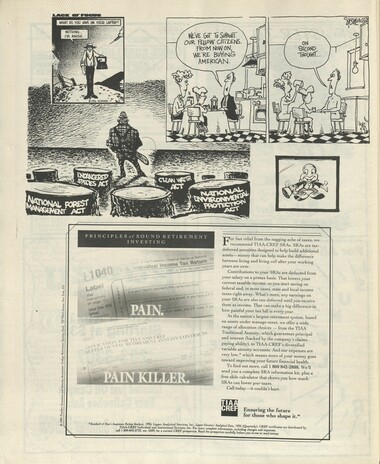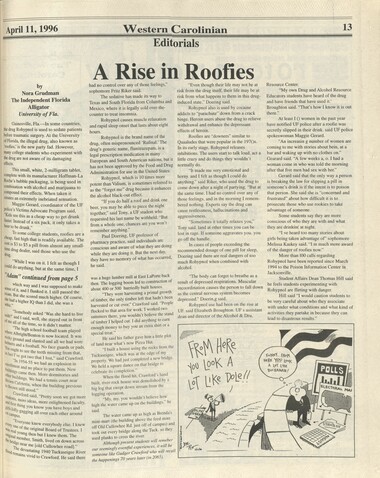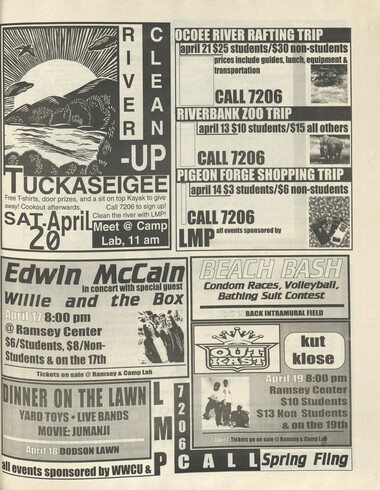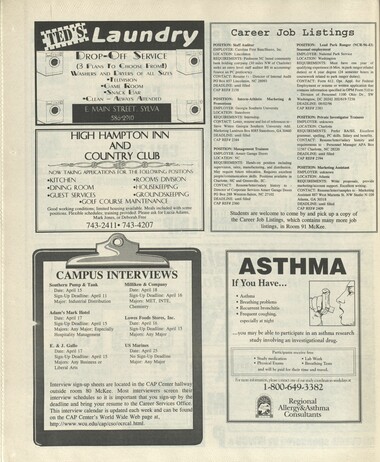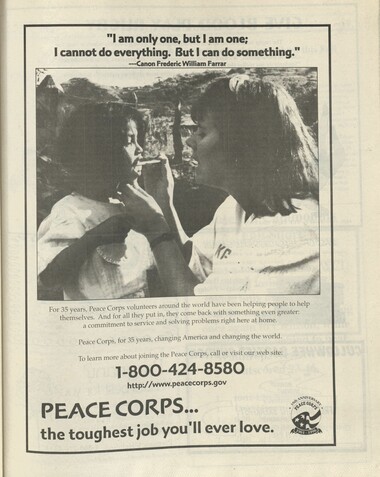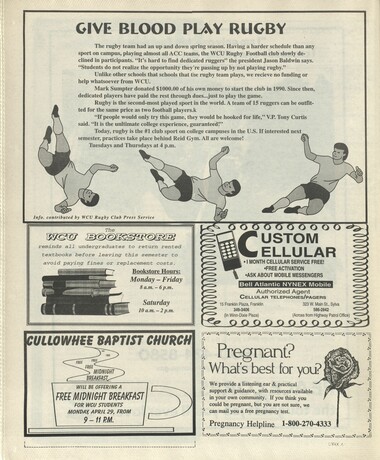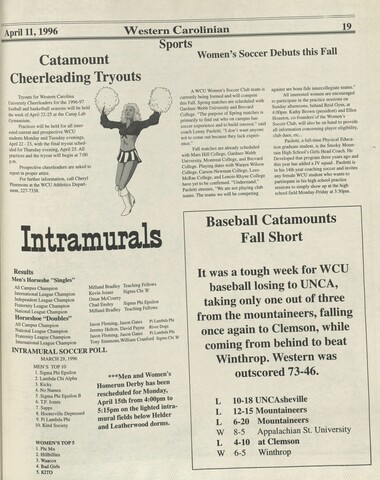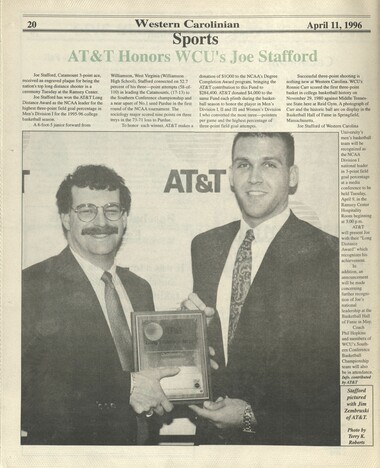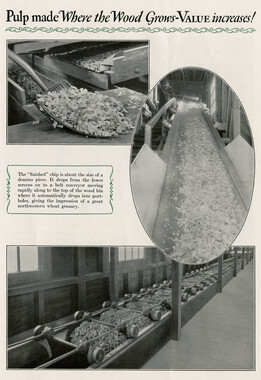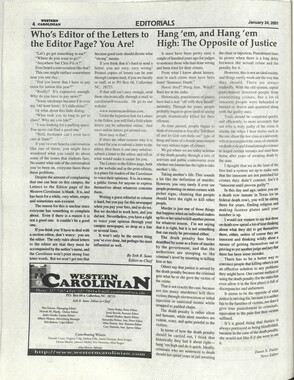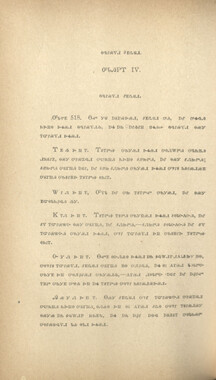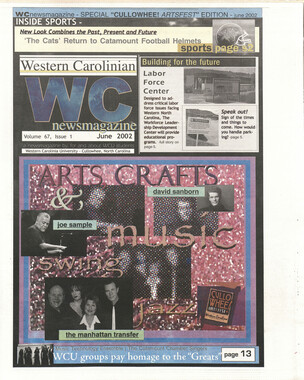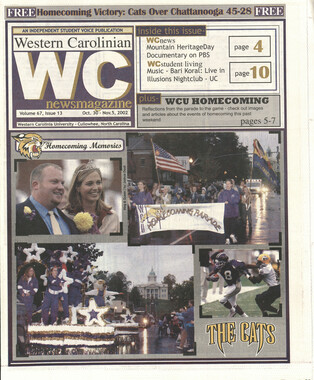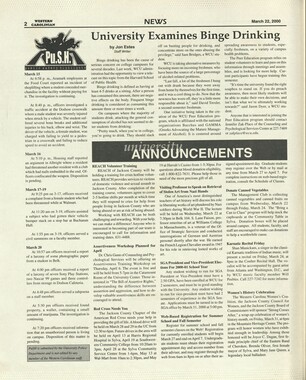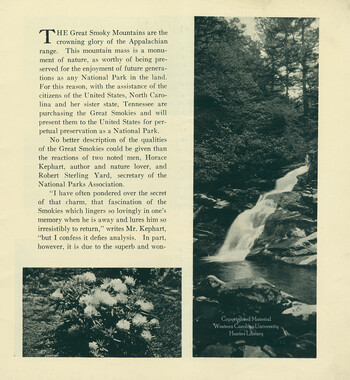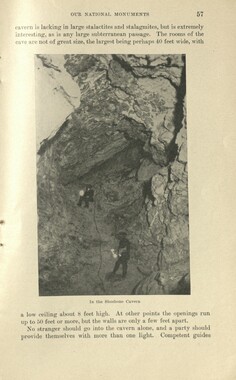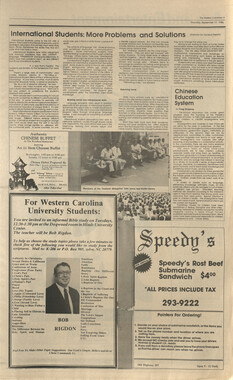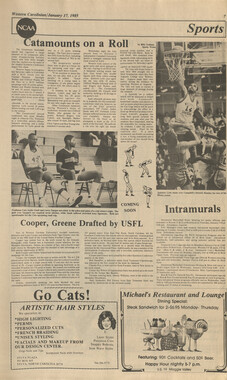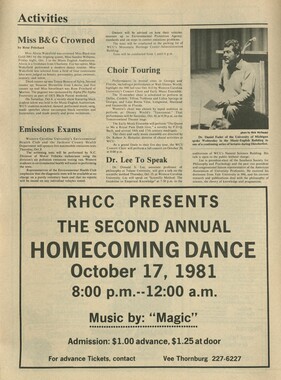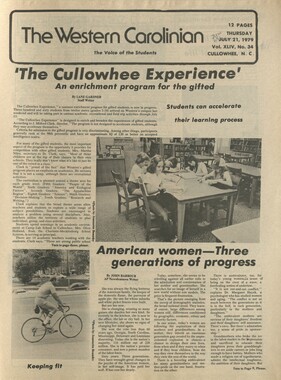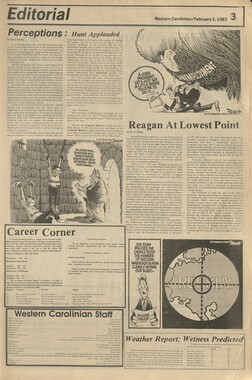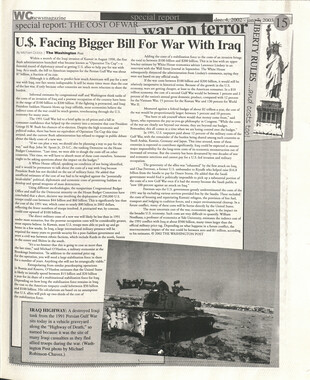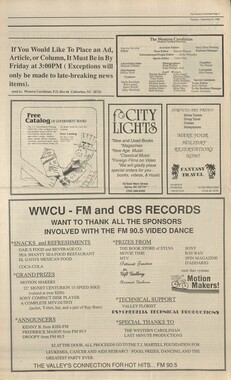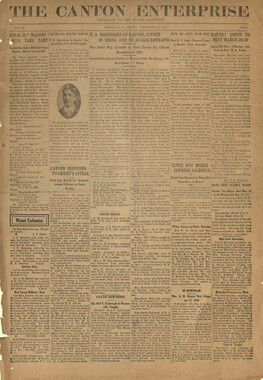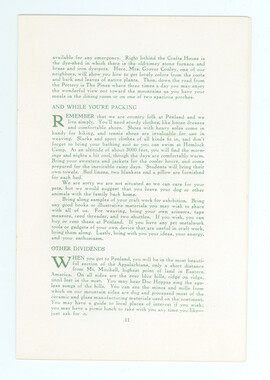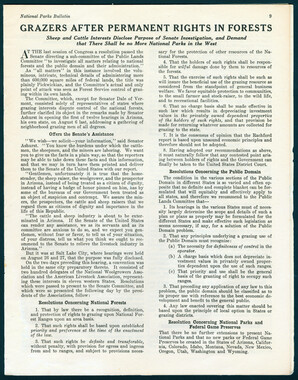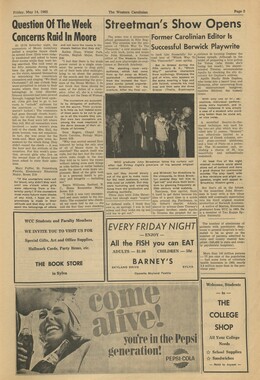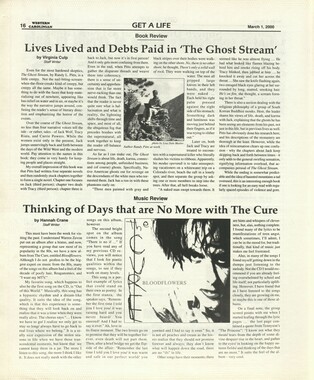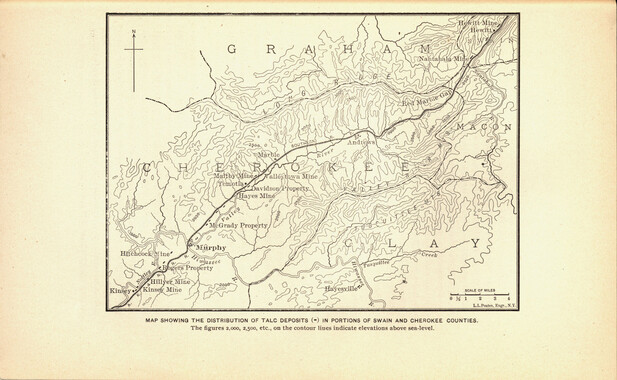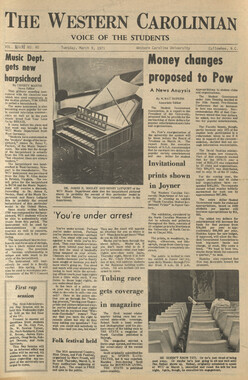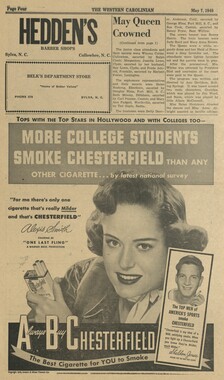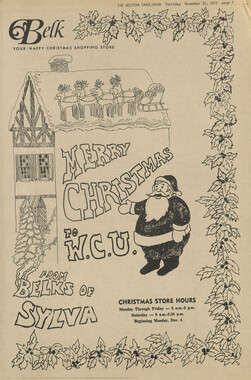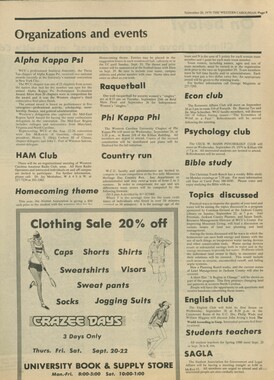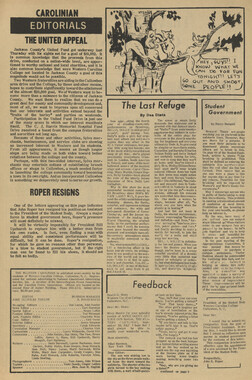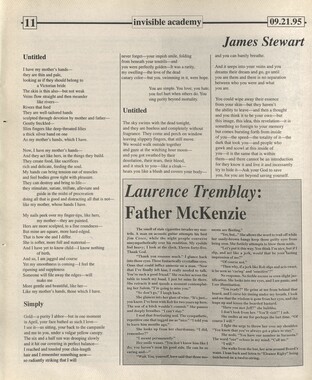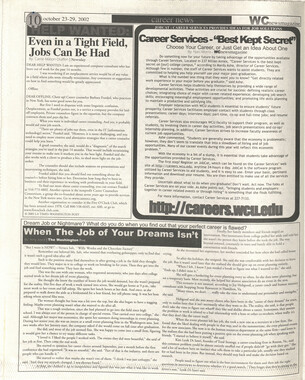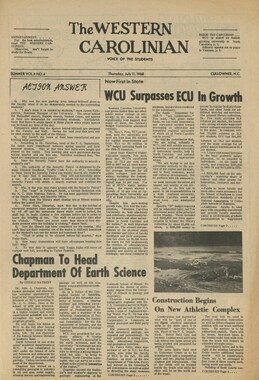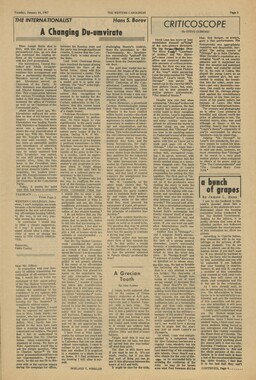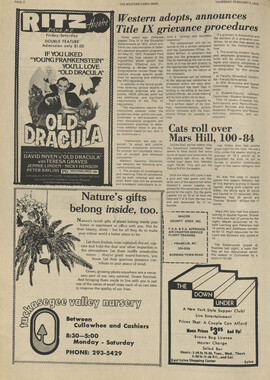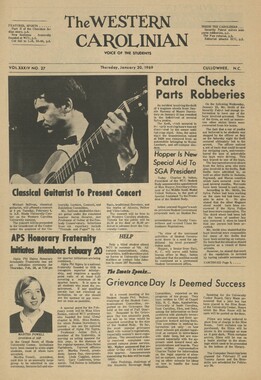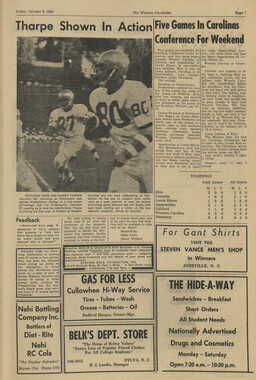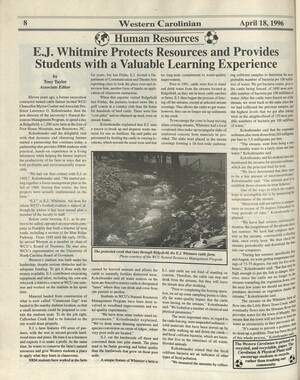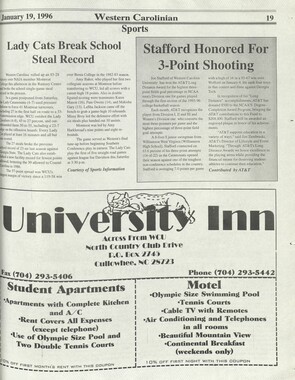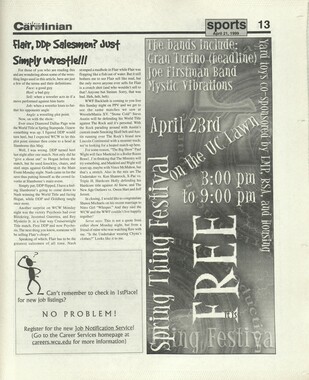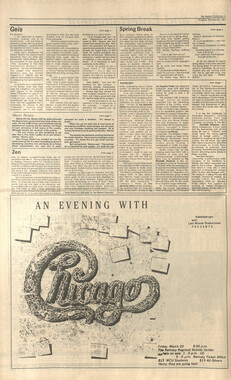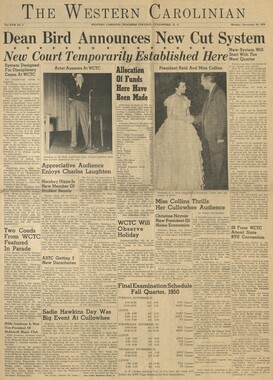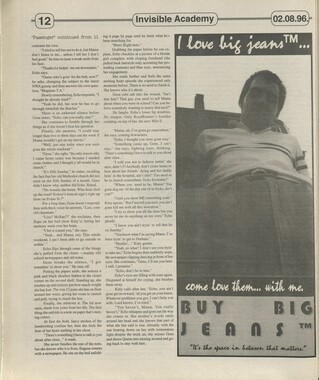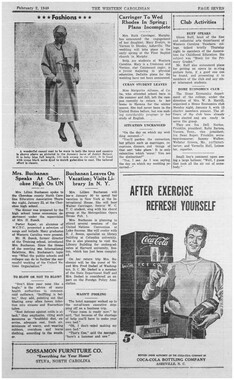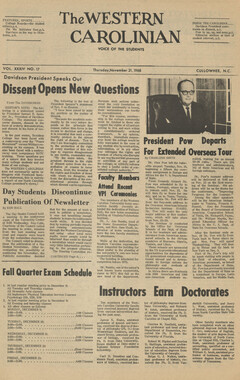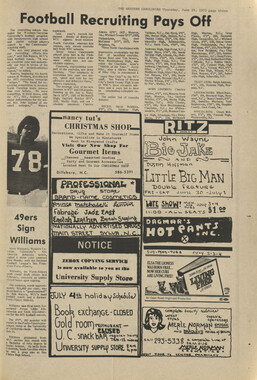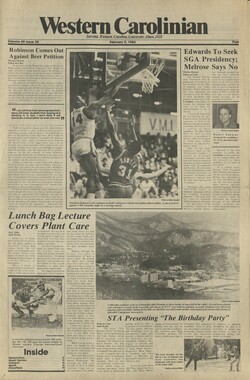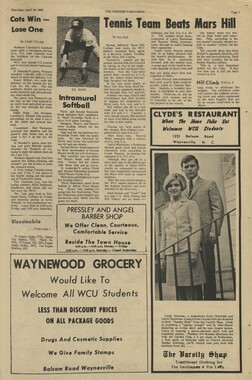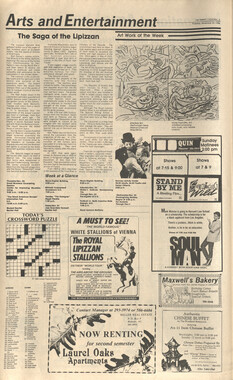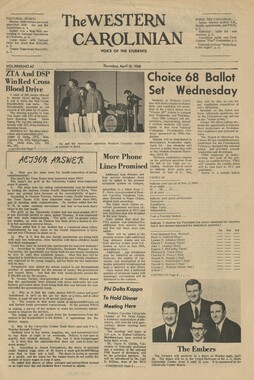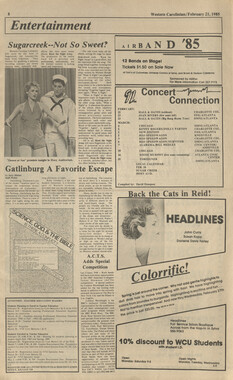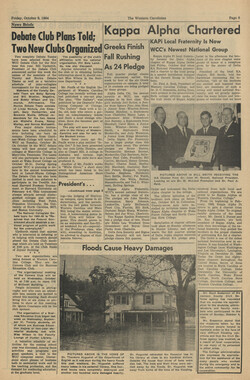Western Carolina University (20)
View all
- Canton Champion Fibre Company (2308)
- Cherokee Traditions (293)
- Civil War in Southern Appalachia (165)
- Craft Revival (1942)
- Great Smoky Mountains - A Park for America (2767)
- Highlights from Western Carolina University (430)
- Horace Kephart (941)
- Journeys Through Jackson (154)
- LGBTQIA+ Archive of Jackson County (26)
- Oral Histories of Western North Carolina (314)
- Picturing Appalachia (6772)
- Stories of Mountain Folk (413)
- Travel Western North Carolina (160)
- Western Carolina University Fine Art Museum Vitreograph Collection (129)
- Western Carolina University Herbarium (92)
- Western Carolina University: Making Memories (708)
- Western Carolina University Publications (2283)
- Western Carolina University Restricted Electronic Theses and Dissertations (146)
- Western North Carolina Regional Maps (71)
- World War II in Southern Appalachia (131)
University of North Carolina Asheville (6)
View all
- Allanstand Cottage Industries (62)
- Appalachian National Park Association (53)
- Bennett, Kelly, 1890-1974 (1388)
- Berry, Walter (76)
- Brasstown Carvers (40)
- Carver, George Washington, 1864?-1943 (26)
- Cathey, Joseph, 1803-1874 (1)
- Champion Fibre Company (233)
- Champion Paper and Fibre Company (297)
- Cherokee Indian Fair Association (16)
- Cherokee Language Program (22)
- Crowe, Amanda (40)
- Edmonston, Thomas Benton, 1842-1907 (7)
- Ensley, A. L. (Abraham Lincoln), 1865-1948 (275)
- Fromer, Irving Rhodes, 1913-1994 (70)
- George Butz (BFS 1907) (46)
- Goodrich, Frances Louisa (120)
- Grant, George Alexander, 1891-1964 (96)
- Heard, Marian Gladys (60)
- Kephart, Calvin, 1883-1969 (15)
- Kephart, Horace, 1862-1931 (313)
- Kephart, Laura, 1862-1954 (39)
- Laney, Gideon Thomas, 1889-1976 (439)
- Masa, George, 1881-1933 (61)
- McElhinney, William Julian, 1896-1953 (44)
- Niggli, Josephina, 1910-1983 (10)
- North Carolina Park Commission (105)
- Osborne, Kezia Stradley (9)
- Owens, Samuel Robert, 1918-1995 (11)
- Penland Weavers and Potters (36)
- Roberts, Vivienne (15)
- Roth, Albert, 1890-1974 (142)
- Schenck, Carl Alwin, 1868-1955 (1)
- Sherrill's Photography Studio (2565)
- Southern Highland Handicraft Guild (127)
- Southern Highlanders, Inc. (71)
- Stalcup, Jesse Bryson (46)
- Stearns, I. K. (213)
- Thompson, James Edward, 1880-1976 (226)
- United States. Indian Arts and Crafts Board (130)
- USFS (683)
- Vance, Zebulon Baird, 1830-1894 (1)
- Weaver, Zebulon, 1872-1948 (58)
- Western Carolina College (230)
- Western Carolina Teachers College (282)
- Western Carolina University (1794)
- Western Carolina University. Mountain Heritage Center (18)
- Whitman, Walt, 1819-1892 (10)
- Wilburn, Hiram Coleman, 1880-1967 (73)
- Williams, Isadora (3)
- Cain, Doreyl Ammons (0)
- Crittenden, Lorraine (0)
- Rhodes, Judy (0)
- Smith, Edward Clark (0)
- Appalachian Region, Southern (2399)
- Asheville (N.C.) (1917)
- Avery County (N.C.) (26)
- Blount County (Tenn.) (161)
- Buncombe County (N.C.) (1671)
- Cherokee County (N.C.) (283)
- Clay County (N.C.) (555)
- Graham County (N.C.) (233)
- Great Smoky Mountains National Park (N.C. and Tenn.) (510)
- Haywood County (N.C.) (3522)
- Henderson County (N.C.) (70)
- Jackson County (N.C.) (4692)
- Knox County (Tenn.) (25)
- Knoxville (Tenn.) (12)
- Lake Santeetlah (N.C.) (10)
- Macon County (N.C.) (420)
- Madison County (N.C.) (211)
- McDowell County (N.C.) (39)
- Mitchell County (N.C.) (132)
- Polk County (N.C.) (35)
- Qualla Boundary (981)
- Rutherford County (N.C.) (76)
- Swain County (N.C.) (2113)
- Transylvania County (N.C.) (247)
- Watauga County (N.C.) (12)
- Waynesville (N.C.) (73)
- Yancey County (N.C.) (72)
- Aerial Photographs (3)
- Aerial Views (60)
- Albums (books) (4)
- Articles (1)
- Artifacts (object Genre) (228)
- Bibliographies (1)
- Biography (general Genre) (2)
- Cards (information Artifacts) (38)
- Clippings (information Artifacts) (191)
- Crafts (art Genres) (622)
- Depictions (visual Works) (21)
- Design Drawings (1)
- Drawings (visual Works) (184)
- Envelopes (73)
- Facsimiles (reproductions) (1)
- Fiction (general Genre) (4)
- Financial Records (12)
- Fliers (printed Matter) (67)
- Glass Plate Negatives (381)
- Guidebooks (2)
- Internegatives (10)
- Interviews (812)
- Land Surveys (102)
- Letters (correspondence) (1013)
- Manuscripts (documents) (619)
- Maps (documents) (177)
- Memorandums (25)
- Minutes (administrative Records) (59)
- Negatives (photographs) (5835)
- Newsletters (1285)
- Newspapers (2)
- Occupation Currency (1)
- Paintings (visual Works) (1)
- Pen And Ink Drawings (1)
- Periodicals (193)
- Personal Narratives (10)
- Photographs (12976)
- Plans (maps) (1)
- Poetry (7)
- Portraits (1960)
- Postcards (329)
- Programs (documents) (151)
- Publications (documents) (2237)
- Questionnaires (65)
- Scrapbooks (282)
- Sheet Music (2)
- Slides (photographs) (402)
- Songs (musical Compositions) (2)
- Sound Recordings (796)
- Specimens (92)
- Speeches (documents) (15)
- Tintypes (photographs) (8)
- Transcripts (322)
- Video Recordings (physical Artifacts) (23)
- Vitreographs (129)
- Text Messages (0)
- A.L. Ensley Collection (275)
- Appalachian Industrial School Records (7)
- Appalachian National Park Association Records (336)
- Axley-Meroney Collection (2)
- Bayard Wootten Photograph Collection (20)
- Bethel Rural Community Organization Collection (7)
- Blumer Collection (5)
- C.W. Slagle Collection (20)
- Canton Area Historical Museum (2110)
- Carlos C. Campbell Collection (282)
- Cataloochee History Project (65)
- Cherokee Studies Collection (4)
- Daisy Dame Photograph Album (5)
- Daniel Boone VI Collection (1)
- Doris Ulmann Photograph Collection (112)
- Elizabeth H. Lasley Collection (1)
- Elizabeth Woolworth Szold Fleharty Collection (4)
- Frank Fry Collection (95)
- George Masa Collection (173)
- Gideon Laney Collection (452)
- Hazel Scarborough Collection (2)
- Hiram C. Wilburn Papers (28)
- Historic Photographs Collection (236)
- Horace Kephart Collection (861)
- Humbard Collection (33)
- Hunter and Weaver Families Collection (1)
- I. D. Blumenthal Collection (4)
- Isadora Williams Collection (4)
- Jesse Bryson Stalcup Collection (47)
- Jim Thompson Collection (224)
- John B. Battle Collection (7)
- John C. Campbell Folk School Records (80)
- John Parris Collection (6)
- Judaculla Rock project (2)
- Kelly Bennett Collection (1407)
- Love Family Papers (11)
- Major Wiley Parris Civil War Letters (3)
- Map Collection (12)
- McFee-Misemer Civil War Letters (34)
- Mountain Heritage Center Collection (4)
- Norburn - Robertson - Thomson Families Collection (44)
- Pauline Hood Collection (7)
- Pre-Guild Collection (2)
- Qualla Arts and Crafts Mutual Collection (12)
- R.A. Romanes Collection (681)
- Rosser H. Taylor Collection (1)
- Samuel Robert Owens Collection (94)
- Sara Madison Collection (144)
- Sherrill Studio Photo Collection (2558)
- Smoky Mountains Hiking Club Collection (616)
- Stories of Mountain Folk - Radio Programs (374)
- The Reporter, Western Carolina University (510)
- Venoy and Elizabeth Reed Collection (16)
- WCU Gender and Sexuality Oral History Project (32)
- WCU Mountain Heritage Center Oral Histories (25)
- WCU Oral History Collection - Mountain People, Mountain Lives (71)
- WCU Students Newspapers Collection (1744)
- Western North Carolina Tomorrow Black Oral History Project (69)
- William Williams Stringfield Collection (2)
- Zebulon Weaver Collection (109)
- African Americans (390)
- Appalachian Trail (35)
- Artisans (521)
- Cherokee art (84)
- Cherokee artists -- North Carolina (10)
- Cherokee language (21)
- Cherokee pottery (101)
- Cherokee women (208)
- Church buildings (167)
- Civilian Conservation Corps (U.S.) (110)
- College student newspapers and periodicals (1830)
- Dams (103)
- Dance (1023)
- Education (222)
- Floods (61)
- Folk music (1015)
- Forced removal, 1813-1903 (2)
- Forest conservation (220)
- Forests and forestry (1058)
- Gender nonconformity (4)
- Great Smoky Mountains National Park (N.C. and Tenn.) (181)
- Hunting (38)
- Landscape photography (10)
- Logging (103)
- Maps (84)
- Mines and mineral resources (8)
- North Carolina -- Maps (18)
- Paper industry (38)
- Postcards (255)
- Pottery (135)
- Railroad trains (71)
- Rural electrification -- North Carolina, Western (3)
- School integration -- Southern States (2)
- Segregation -- North Carolina, Western (5)
- Slavery (5)
- Sports (452)
- Storytelling (245)
- Waterfalls -- Great Smoky Mountains (N.C. and Tenn.) (66)
- Weaving -- Appalachian Region, Southern (280)
- Wood-carving -- Appalachian Region, Southern (328)
- World War, 1939-1945 (173)
Western Carolinian Volume 61 Number 21
Item
Item’s are ‘child’ level descriptions to ‘parent’ objects, (e.g. one page of a whole book).
-
-
14 Western Carolinian April 11,1996 Editorials Serotonindipity Things the Liberal Press Establishment Never Mentioned by James Gray In December I had the opportunity to hear the Speaker of the House shamelessly plug Charles Taylor at one of his Asheville fundraisers. It was, strangely enough, both a mortifying and gratifying feeling to see one of the most colorful figures in American politics from the past few decades. Of the topics Gingrich touched on in his fiery "up with the plutocrats" speech, the most memorable for me will always be his attacks on the "liberal elite" media and their "fantasy polls" that paint a dark picture of him. In fact, anti-media sentiments seemed to draw the biggest response from the crowd of diners packed into that Grove Park Inn banquet hall. But for the media to be so liberal, they sure have been hush-hush during the suppression of democratic principles around the world. From Iraq to Indonesia and Guatemala to Greece [and literally dozens of other nations worldwide] the U.S. has intervened in internal politics. But where was the "leftist" press?— peering through a keyhole (and giving us only a segment of the story) or sticking their heads in the mud. Since the 1960s, CIA operatives have undermined popular movements and sponsored coups in almost half of the countries in Latin America. And what was always the guise for invading countries on the verge of independence and self-sufficiency, COMMUNISM! Our government sent mass waves of paranoia through this country by telling the public that if we didn't stop popular socialist-oriented movements in "our" hemisphere, mobs of Hispanic communists would soon flood over our borders. During the wee hours of Sunday morning I was lying in the bed, unable to sleep, listening to a Easter special on the BBC World Service. The special presented the music of Catholic monks written about war and pestilence in some of the world's poorest countries. Two of the three countries featured on this special can thank American intervention for their mountains of human misery. Cambodia and El Salvador were both ripped apart by war and pestilence, which led to death in the thousands (or in Cambodia's case, in the millions). And what was the reason we sponsored "killing fields" in these banana republics— the fear that one of them might crawl out from under the thumb of the developed world. In the 1970s the Catholic churches in El Salvador began organizing peasants into unions, cooperatives and Bible study groups, all of which were becoming a very popular means for the masses to organize into self-help groups. These "popular organizations" were formed to counteract the atrocities carried out by the ARENA party. As the 1970s came to a close tension was mounting between the church-led peasant groups and the CIA-backed ARENA party. In February of 1980 Oscar Romero, the Archbishop of El Salvador, sent a letter to President "Peanut" Carter begging him to stop sending arms and aid to the ARENA faction. He said aid to them was used to "sharpen injustice and repression against the people's organizations" which were struggling "for respect for their most basic human rights." Less than a month later, Romero was assassinated while saying a mass. Roberto d'Abuissson, "leader for life" of the ARENA party, is generally credited with carrying it out. D'Abuisson is known as a merciless killer who requires that party members, like president Alfredo Cristiani, swear an oath of loyalty in blood. Two weeks prior to the assassination an ARENA force, aided by Honduran troops, began the all-out war against the Salvadoran people. On March 7, 1980, this force massacred at least 600 peasants at Rio Sampul. Children and babies were chopped to pieces with machetes and women were raped and drowned in the river. For days the Rio Sampul ran red and was littered with human limbs. By the end of 1980 the death toll in El Salvador rose to 10,000 as the American- backed d'Abuisson ordered the systematic elimination of labor leaders, students and other dissidents. In other words, the threat of true democracy, of the people, by the people and for the people, within our "sphere of influence" made Washington very nervous. Catholic church officials were on hand to witness the atrocities at Rio Sampul, but did journalists pick up on it? I cannot imagine any corespondent unfortunate to witness this display living to tell about it, but the church disseminated accounts far and wide in hopes that a developed nation might lend a sympathetic hand. Yet no stories or editorials appeared in the American press about this slaughter or the Romero assassination, not even in that great "liberal anchor" of the U.S. media— The New York Tunes. Only after the US- supported Atlacatl Battalion raped four American nuns did the atrocities of El Salvador find their way into the media. Thousands of Latin American peasants die for self-determination, who cares? The BBC special also talked about the death toll in Indochina during the years surrounding the Vietnam War. English correspondents were traveling with a group of French Jesuit priests who were returning to a recently restored monastery in Cambodia. Almost twenty years ago these priests were exiled by the Khmer Rouge, but political reform have allowed religion back into Cambodian society. The Gregorian chants were a haunting reflection of the 3.3 million people killed there during the 1970s. As the Vietnam War was coming to a close, US aircraft carpeted about half of this country with bombs. The hundreds of thousands killed in these raids were peasant fanners, most of whom did not even know Cambodia existed— they only knew they lived in a little village a few kilometers down the road from a few other tiny villages. United States journalists had ample opportunity to file stories on the American bomb raids. In 1973 New York Times reporter Sidney Shanberg was the chief US correspondent in Phnom Penh, the capital of Cambodia. He wrote a number of stories about Pol Pot and his Marxist Khmer Rouge party, but he never devoted more than a few sentences to the bombing raids we were carrying out in the interior of the nation. Shanberg did not mention that Pol Pot might not have come to power if the US had not been so intent on crippling this nation, either. That's not to say the Khmer Rouge did not deserve to be exposed for slaughtering so many of their own people. Shanberg did not have to venture into the heart of Cambodia to report on the destruction of this defenseless nation; he could have walked out into the street in front of his plush hotel and interviewed any of the tens of thousands of refugees swarming Phnom Penh from the countryside. Was the effort too great or did someone order him to turn a blind eye? You make the call. Thanks to almost twenty years of economic sanctions and United Nations intervention, things look a little better for the people of Cambodia today. More recently, the liberal American press only filled us in on part of another story— the "conflict" between China and Taiwan. In the weeks leading up to Taiwan's first free elections ever, an independent candidate was running very close to the presiding Nationalist candidate, Lee Teng-hui. The mainland sent a message to Taiwan loud and clear: "Don't vote for Lee." So the Taiwanese, who harbor a deep grudge against the red Chinese, did exactly that. Lee ended up sweeping the election with over 80 percent of the vote. Only after the election was it publicized that Lee did not favor separating from the mainland. In fact, he went on the record saying that China and Taiwan are economically dependent on each other and should move closer to renunciation. To make a long story short, the Communists bluffed the Taiwanese into doing exactly what they wanted, Lee read it like a script and the two factions rattled sabers in the South China Sea. The mainstream corporate media did their part by daring not to peek beneath the surface of another conflict, opting to turn their heads so America can get on with the real business of the world. The Western Carolinian Lynn Jones Editor in Chief Colin Gooder Assistant Editor Associate Editors Tony Taylor News Scott Francis Features Terry Roberts Sports Katherine Torrence Jill of All Trades Sean Corcoran Photography Tracy Hart Copy Editor Earle Wheeler Invisible Academy Lee Ann Gibson Advertising Director Paste-up Staff Cliff Meeks Office Director Christine Wilcox Design & Layout Jenifer Jackson Carolinian Advisor John Moore The Carolinian is WCU's student newpaper. It is produced entirely by students. Deadline for submissions is the Thursday before each publication. The opinions expressed in the editorial section of the Carolinian in no way represent those of the Carolinian or the WCU campus. Editorials are written to inspire thought, not to offend or be taken personally.
Object
Object’s are ‘parent’ level descriptions to ‘children’ items, (e.g. a book with pages).
-
The Western Carolinian is Western Carolina University's student-run newspaper. The paper was published as the Cullowhee Yodel from 1924 to 1931 before changing its name to The Western Carolinian in 1933.
-
